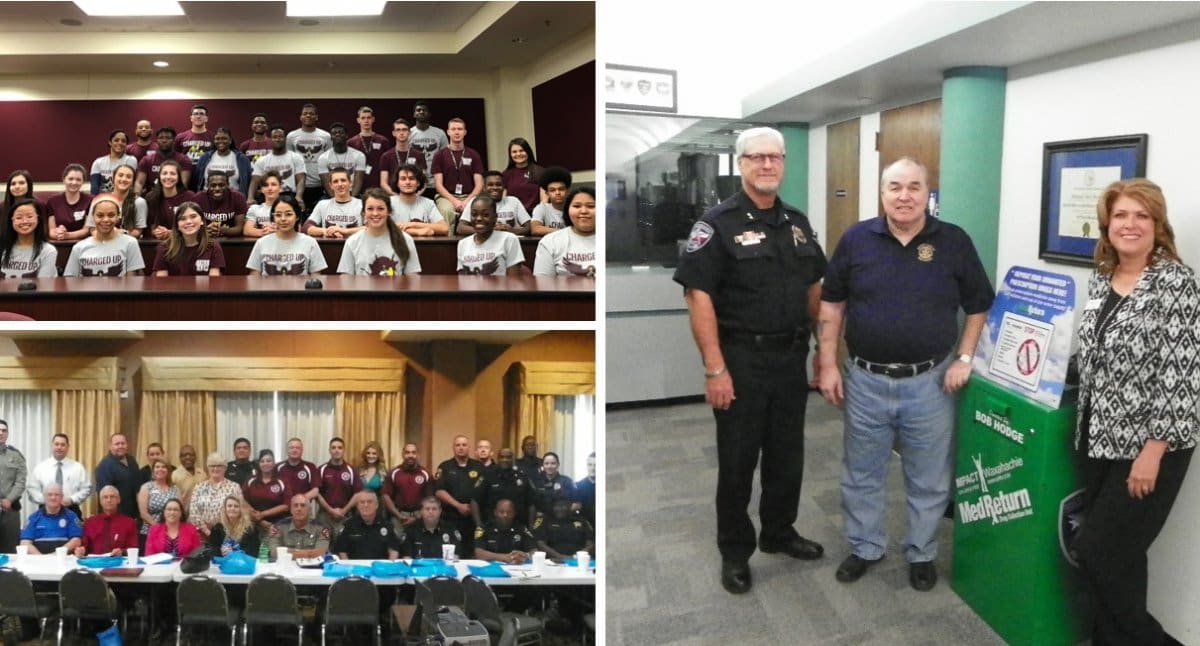
Tell me about your community and the communities that your coalition serves – its population and unique features. When was the coalition formed?
IMPACT Waxahachie was formed in 2008, and is part of an umbrella organization called Drug Prevention Resources, which is Texas’ oldest prevention-focused nonprofit organization. Waxahachie is the county seat for Ellis County, Texas. The town has a current population of about 42,000 people, and is a rural suburban area with a downtown historical and business district that draws in many visitors. In addition to Waxahachie, the coalition also serves rural farming communities in Ellis County, including Maypearl, Italy, Milford, Avalon, and Ferris, and the city of Red Oak. Throughout the area, high school football is a key part of local culture that drives the community together.
What unique issues is your coalition facing?
“Our coalition is facing several issues,” said Program Manager Shari Phillips, “including underage drinking at house parties and ‘pasture parties’ on county land. The vaping and Juuling epidemic has also impacted our young people, and some kids are also using these devices to smoke Tetrahydrocannabinol (THC).”
What activity or program is your coalition most proud of and/or what activity would you like us to spotlight?
“We have several programs that we are extremely proud of,” said Phillips. “For our Drug Disposal Program, we have partnered with eight law enforcement agencies in Ellis County to provide drug drop boxes within the communities. We also provide permanent signage of safe disposal locations to local pharmacies, city halls, health clinics, doctor’s offices, and funeral homes. We have established a website at www.therxdropbox.com with locations and safe storage and disposal information. We have also used this partnership with law enforcement and first responders as a way to offer them training on current trends, safe party dispersal, opioid overdose/Naloxone administration, and the Hidden in Plain Sight campaign.”
“We have also started social norms campaigns for both our students and their parents,” said Phillips. The Red Oak High School Impact Leadership Street Team is a peer perception, positive peer driven youth/campus campaign, and the “Crazy for My Kids” Safe Home Network is our social norms campaign for parents, guardians, and community members. The Crazy for My Kids Campaign encourages adults to pledge to not allow youth access in their homes to alcohol, tobacco and other drugs. We have had over 1000 households take the pledge to have a safe home. As part of this campaign, we have been able to enact a social host ordinance, which is an extra tool for our law enforcement to use when a criminal charge cannot be made. This initiative is a deterrent for property owners to allow underage drinking on their properties.”
How did you get there, and what are your outcomes?
“We have a good relationship with our local city law enforcement departments and our Ellis County Sheriff’s Department,” said Phillips. “During the bi-annual Drug Enforcement Agency (DEA) take back days, both departments saw there was a need for a permanent disposal program. Through community collaboration, we were able to purchase drop boxes and incinerators. Through this program, we have collected pounds of unused medications, increase knowledge of safe storage and disposal, and increased the number of communities participating in the program. Our relationship with law enforcement has also allowed us to offer specialized trainings for law enforcement and first responders, and increase the number of citations written for violations of the social host ordinance.”
“Through our youth social norms campaign, we have seen youth be empowered to facilitate peer to peer discussions, resulting in overall decreases in both the perception of use of substance misuse at Red Oak High School and in substance use among youth,” said Phillips. “And through our adult social norms campaign, we have made connections with community leaders, teachers, law enforcement and pastors, who have agreed to be representatives for our campaign. As a result, we have increased the number of pledges received to stop youth use of alcohol and other substances.”
What advice would you give to other coalitions that may be addressing some of the same issues?
“Collaborate and build relationships for capacity,” said Phillips. “You may find that others in the community may be working on similar issues. Work within the school district, get to know the staff and get the staff on board for your initiatives. We could not have led a social norms campaign without 100% participation from the school district. They pointed us to the right group of kids and the right staff members to take on the necessary organization and responsibility. Also, be visible and maintain a good relationship with media. Listening has also been an important skill for us, and it helps us to understand priorities and actual local conditions to direct our programming and meet needs.”
Will you be attending the 2019 Mid-Year Training Institute and, if so, what lessons do you hope to take back to your coalition from the event?
“I hope to,” said Phillips. “As vaping/Juuling has been a big issue in our area, I hope to get more information to take back and share with community members and school districts.”
Feel free to add anything else that you think is important for other coalitions to know about your progress, journey etc.
“Be patient,” said Phillips, “as many initiatives take time to implement and establish. Building relationships with other community partners is key. Having key stakeholders with the same passion and vision is important, but don’t be discouraged if community members rotate in and out based on current action plans.”


